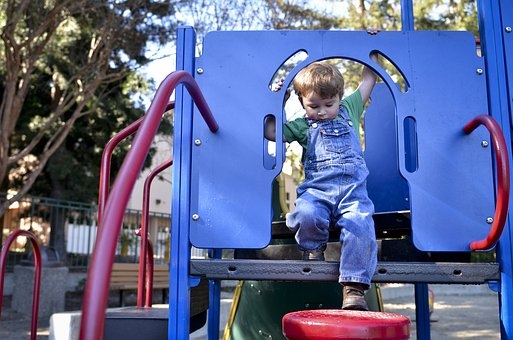Daycare and Preschool Playground Planning Basics

For daycares and preschools, an outdoor play area is a must. The benefits of play are well known and lauded. Outdoor play allows children to move freely, run, explore, be messy and learn. Playgrounds provide the opportunity to develop cognitive skills, motor skills, vestibular senses and overall body strength. Ultimately, play is essential.
Designing a playground that is supposed to guide children as they grow can be daunting. Which slide is right? Which swing set works for your group of children? Can all of the kids at the center play at once? These are just some of the questions that will be raised. Fortunately, putting together a playground that fits your budget, demographics, space and educational beliefs as a center is easier than you might think.
How do I start planning a preschool playground?
The process can be overwhelming at first, but by identifying a few factors, it can be made much easier. Before you start looking at playgrounds online, answer these questions for yourself:
- How much space do you have?
- How many children will be playing on the playground at once?
- What ages of children do you have?
- What are your goals with this playground?
- How much money do you have to spend?
We’ll break this down question by question to help you plan.
How much space do you have?
Space can be the largest limiting factor for playground design. One of the most overlooked factors is that you will typically have a use zone around each piece of equipment. A use zone is a space set around a piece of equipment that allows for children to have full freedom of movement and a safe area to fall in.
How many children will be playing on the playground at once?
Try to figure out roughly how many children will be playing on the playground at once and then add a few extra based on how quickly your business has been growing. So if you’re growing by a student a class each year, it makes sense to add three to your number in a playground designed for one class to use it at once.
What ages of children do you have?
Playgrounds are designed for the following age groups:
If you are only going to have children between the ages of 6 - 23 months or 2 - 5 years old, you will need a playground designed for only 6 - 23 months and one for 2 - 5 years old. If you have an afterschool program, you might need a playground designed for 2 - 12 years old instead of merely 2 - 5 years old. While 2 - 5 year old children and 5 - 12 year olds need to play at different times for safety, the equipment can be used for both age groups.
What are your goals with this playground?
Playgrounds are places where children can learn, play, socialize, develop skills and explore. There is so much equipment available on the market to accomplish these goals that entire playgrounds can be built around specific concepts. Here are a few suggestions:
- Motor skill development - These would be playgrounds that have activities that require large muscle movement for gross motor skills and small hand guided activities for fine motor skills.
- Socialization - These would feature group activities like spring riders for two, see-saws, merry-go-rounds and panel that encourage imaginative play.
- Education - Panels for sign language, spelling, math and science can be added providing a cerebral experience.
- Nature - These are playgrounds or playhouses with a nature theme or pieces of equipment, like water tables, that allow children to explore natural forces.
How much money do you have to spend?
At the end of the day, there will probably be a limit on the amount of money at your disposal. Be sure to check out our Grants and Stimulus guide for a list of funds available through various organizations. Or once you are ready to make a playground purchase, check into our Financing options to help make your playground a reality.

What is the best preschool playground?
After considering all of those points, you should be able to start picking appropriate pieces for your playground.
If you have a small area, it is important to look for equipment that can maximize its use of space. Some of the best playground equipment for preschools with limited space:
- Playhouses with activities on both the inside and outside
- Play Structures that utilize horizontal and vertical space
- Spring Riders that seat 2 or more children
- T-Post Swings
If you have a variety of ability levels, look for equipment that children can use in new ways as they grow. Some examples are:
- Composite Structures with different types of climbers
- Cantilever Swing Sets that can be fitted with bucket and belt seats
- Musical Instruments
These are just a few ideas on what could be put in your playground. Ultimately, the best playground is where children can play, learn, socialize and have fun.
Find more about the author: Kim Hart

